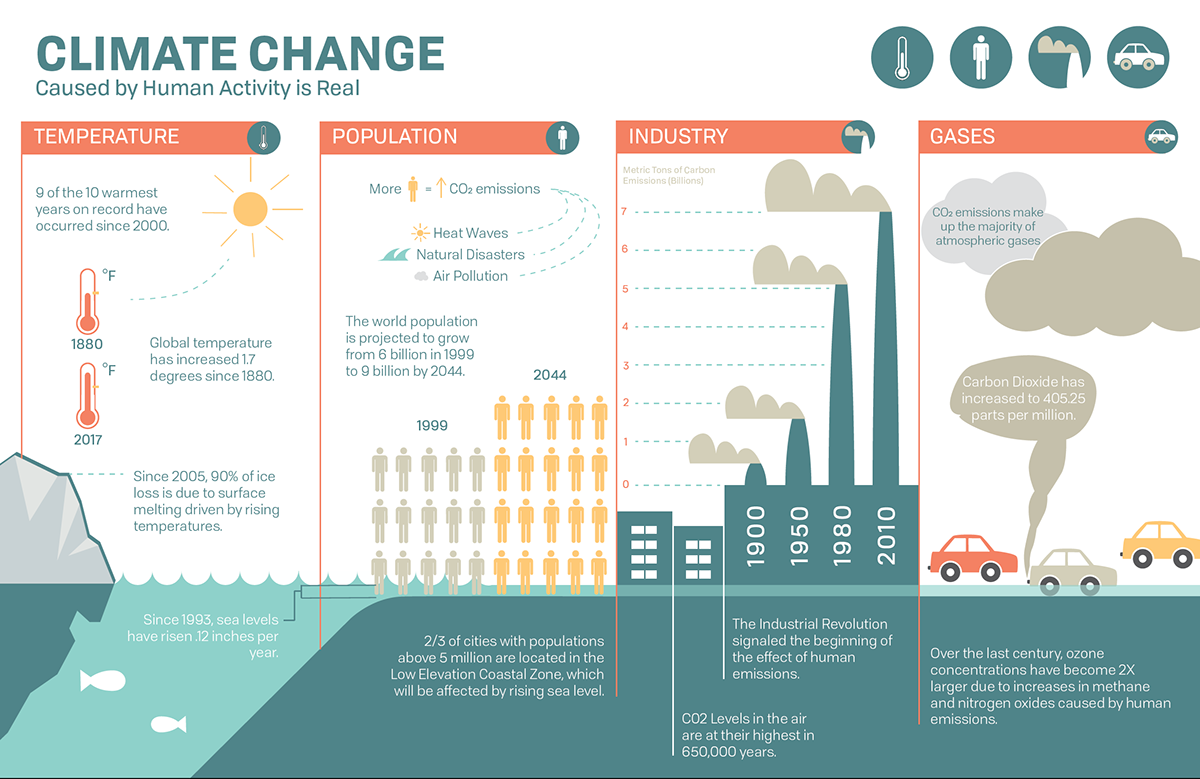

Together, this means carbon pricing can support both a clean economy and a prosperous one.

In addition (and this point is also often overlooked), carbon pricing will achieve these outcomes at a lower economic cost than other policies. And higher carbon prices drive deeper emissions reduction. The evidence is clear: carbon pricing shifts us away from "business as usual," changing our emissions trajectory. And we’ve looked at the other climate policies that work best with carbon pricing.ĭone right, carbon pricing changes household and business behaviour, reduces GHG emissions, and drives the development and adoption of the technologies that will play a key role in a low-carbon economy. We’ve considered the best ways for governments to recycle revenues generated from carbon pricing.
#CLIMATE CHANGE INFOGRAPHIC 2105 HOW TO#
We’ve explored how to design policy for fairness, and how to design it to ensure Canadian businesses remain competitive. The Ecofiscal Commission has undertaken extensive economic research exploring these details, some of it fairly technical. The many details of carbon pricing are important for governments to consider when they design good policy. In short, we need a more informed conversation about carbon pricing. How we design these policies will influence how we live and how we do business. This really matters because carbon pricing affects us all. Governments and policy analysts (including here at the Ecofiscal Commission) haven’t always done a good enough job explaining carbon pricing to Canadians. And there is strong evidence, grounded in solid economics and policy experience, that carbon pricing works.
#CLIMATE CHANGE INFOGRAPHIC 2105 FREE#
While free trade and balanced budgets might now be broadly accepted, they were once controversial ideas.īut debates will support good policy decisions only if they are based on facts and evidence.

Historically, significant shifts in the consensus around policy emerged only after vigorous public discussion. Such policy debates are healthy and necessary. And elections are on the horizon, both nationally and in several provinces, in which carbon pricing could be a source of debate and even a key issue. Yet recently, others have questioned the extent to which carbon pricing will affect GHG emissions. Various economists and policy experts have made the case for carbon pricing as the best way to reduce GHG emissions while maintaining a strong economy. That growing consensus around carbon pricing, however, is not yet universal. And the federal government is now committed to filling in the remaining policy gaps-by requiring every Canadian province and territory to put a price on carbon by the end of 2018. Several large provinces have already introduced well-designed carbon-pricing policies. They want to do their part and contribute to these efforts.Ĭanadians are also moving closer to agreement on how we should tackle these challenges. Canadians do not want to "free ride" on the actions of others. These pages help to answer questions about climate change, what the AM is doing and, importantly, what you can do.Despite its relatively small population, Canada has a role to play in the global efforts to reduce greenhouse gas (GHG) emissions to avoid the worst of these risks. The AM has taken a bold approach to the sustainability of its own operations we have announced the achievement of Climate Active (Carbon Neutral) status, 26 November 2020. We are informed by AM scientists’ work on biodiversity, research on the cultural dimensions of climate change, and First Nations approaches to caring for Country. The first climate communications centre in Australia’s museum sector, the Climate Solutions Centre has been established to increase positive public engagement in climate change. The Australian Museum (AM), with its long-term research and significant outreach about nature and culture, is well-placed to make a strong contribution to documenting and responding to climate change. We can better care for nature, each other and ourselves. Humans have created the crisis and we have the skills and solutions to turn it around. Climate change is a crisis that threatens our life-support systems.


 0 kommentar(er)
0 kommentar(er)
